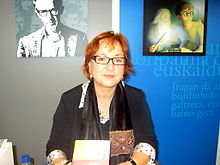Miren Agur Meabe
Miren Agur Meabe | |
|---|---|
 Meabe in 2007 | |
| Born | 7 October 1962 Lekeitio, Spain |
| Occupation | Writer, translator |
| Language | Basque |
| Citizenship | Spain |
| Notable awards |
|
Miren Agur Meabe Plaza[1] (born 1962) is a Basque poet, prose writer, author of books for children and young adults and a translator. In 2021, she was the first author to win the Spanish Ministry of Culture's National Poetry Award for a work in Basque.[2]
Early life and education
[edit]Miren Agur Meabe was born on 7 October 1962, in Lekeitio, Spain.[1] She studied teaching and Basque philology,[3][4] then for some time worked as a teacher in Bilbao.[4]
Career
[edit]For years, Miren Agur Meabe worked as a publisher,[4] heading de Basque office of the Giltza-Edebé publishing house.[1] Later, she quit publishing to focus on writing.[1] She writes poetry, books for children and young adults, but has also published fiction for adults.[1][5] She had stated that her earliest poetry work was based on copying the style of Rosalía de Castro, as she was the only female poet that appeared in university textbooks at the time.[6]
For her literary work, Meabe has won a number of awards, such as the Lasarte-Oria town council prize for the poetry tome Oi hondarrezko emaikaitz (1991),[1] three Euskadi Literature Prizes for young adult novels Itsaslabarreko etxea (2002), Urtebete itsasargian (2006) and Errepidea (2011) and two Premio de la Crítica awards for poetry books Azalaren kodea (2001) and Bitsa eskuetan (2011).[3][4] Her children's book Mila magnolia-lore (2010) was included in the IBBY Honour List.[5] In 2021, she was the awarded the National Poetry Prize for Nola gorde errautsa kolkoan.[1][7][5] She was the first author to win the prize with a work in Basque.[5][7]
Meabe also works as a translator into Basque.[5][8] She has translated works by such authors as Forough Farrokhzad or Scholastique Mukasonga, and received the Vitoria-Gasteiz Translation Prize twice.[3]
She is a member of the Euskaltzaindia.[3][5]
Bibliography
[edit]- El código de la piel (The Skin Code), 2000, Bassarai Editions
- La casa del acantilado (The House On The Cliff), 2001, Edebé
- Vivo en dos casas (I Live In Two Houses), 2003, Editores asociados
- Cómo corregir a una maestra malvada (How To Correct An Evil Teacher), 2003, Edebé
- Supositorios para el lobo (Suppositories For The Wolf), 2006, Edebé
- Un año en el faro (A Year In The Lighthouse), 2006, Lóguez Ediciones
- Una estrella en la sopa (A Star In The Soup), 2008, Edebé
- ¿Qué es el amor, sino... ? (What is love, if not...?), 2011, Lóguez Ediciones
- La carretera (Road), 2012, Erein Argitaletxea
- Zisnea eta uhartea (The Swan and the Island), 2013, Elkar
- Timuti jirafa (Timuti Giraffe), 2013, Elkar
- Hartz marmartia (Grumbling Bear), 2014, Elkar
- Pinpiriñe, 2014, Elkar
- Izar-Lapurra (The Star Thief), 2014, Elkar
- Kristalezko begi bat (A Glass Eye), 2014, Pamiela (translated from Basque by Amaia Gabantxo, 2017)[9]
- Ros, 2015, Lóguez Ediciones
- Pase al anochecer (Pass At Dusk), 2016, Hualde Alfaro
- Tximeletak (Butterflies), 2016, Elkar
- Espuma en las manos (Foam In Hands), 2017, Ediciones Trea
- Katta adarbakarra, 2021, Elkar
- Quema de huesos (Burning Bones), 2021, Consonni[10][11]
- Cómo guardar ceniza en el pecho (How To Keep Ashes On Your Chest), 2021, Bartleby Editores
- Desberdinen kluba (Club of the Different), 2022, Ttarttalo
References
[edit]- ^ a b c d e f g "Meabe Plaza, Miren Agur". Auñamendi Eusko Entziklopedia (in Spanish). Retrieved 25 February 2023.
- ^ Ormazabal, Mikel (21 September 2021). "Miren Agur Meabe, primera autora en ganar el Premio Nacional de Poesía con una obra en euskera" [Miren Agur Meabe, First Author to Win the National Poetry Award With a Work in Basque]. El País (in Spanish). San Sebastián. Retrieved 27 February 2023.
- ^ a b c d "Miren Agur Meabe". SPAIN - Spilling Creativity Guest of Honour Frankfurter Buchmesse 2022. Retrieved 25 February 2023.
- ^ a b c d "Miren Agur Meabe". Words Without Borders. Retrieved 25 February 2023.
- ^ a b c d e f "La poeta vasca Miren Agur Meabe, Premio Nacional de Poesía 2021". RTVE (in Spanish). 21 September 2021. Retrieved 26 February 2023.
- ^ Ferreira, Maialen (29 March 2022). "Miren Agur Meabe: "Escribir en una lengua pequeña conlleva que nos miren con cierto desinterés"" [Miren Agur Meabe: "Writing in a small language means that they look at us with a certain lack of interest"]. elDiario.es (in Spanish). Retrieved 26 February 2023.
- ^ a b Ormazabal, Mikel (21 September 2021). "Miren Agur Meabe, primera autora en ganar el Premio Nacional de Poesía con una obra en euskera". El País (in Spanish). Retrieved 26 February 2023.
- ^ "Miren Agur Meabe". Tabakalera. Retrieved 26 February 2023.
- ^ "Miren Agur Meabe". Edinburgh International Book Festival. Retrieved 26 February 2023.
- ^ Lewis, Rhiannon (30 October 2022). "Review: Burning Bones by Miren Agur Meabe". Nation.Cymru. Retrieved 26 February 2023.
- ^ Quiroga, Leonor (6 January 2023). "Miren Agur Meabe incinera el peso del ayer en "Quema de huesos"" [Miren Agur Meabe incinerates the weight of yesterday in “Burning Bones”]. Cronica Jolisco (in Spanish). Retrieved 26 February 2023.
- 1962 births
- Living people
- 20th-century Spanish novelists
- 20th-century Spanish poets
- 20th-century Spanish women writers
- 21st-century Spanish novelists
- 21st-century Spanish poets
- 21st-century Spanish women writers
- Basque novelists
- Basque translators
- Basque women writers
- Basque-language poets
- Spanish publishers (people)
- Translators to Basque
